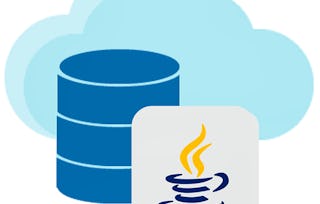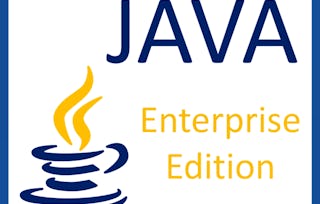This course takes the student through a variety of labs exploring the interaction between Java Object Domain Models and Relational Database Tables, this is becoming the standard approach for database access in Java Applications. The course will illustrate how using meta data annotations, you can map domain objects to database tables, and class properties to columns in those tables for CRUD operations. The student will use numerous Query strategies to retrieve data from a database and consume the data in their applications with minimal effort. The course will talk about the how these meta data annotations can also map compositional and inheritance relationships between classes and a database schemas.

Jakarta Persistence (JPA)

Jakarta Persistence (JPA)
This course is part of Java Database Connectivity Specialization

Instructor: Derek Parsons
1,741 already enrolled
Included with
13 reviews
Recommended experience
Skills you'll gain
Details to know

Add to your LinkedIn profile
3 assignments
See how employees at top companies are mastering in-demand skills

Build your subject-matter expertise
- Learn new concepts from industry experts
- Gain a foundational understanding of a subject or tool
- Develop job-relevant skills with hands-on projects
- Earn a shareable career certificate

There are 3 modules in this course
Interact with databases using Java Persistence Architecture (JPA), defining Persistence configurations for a Persistent Unit. Define JPA entities through various annotations and illustrate how the details of Java Database Connectivity (JDBC) are abstracted away. Implement database CRUD operations using the API of the JPA EntityManager.
What's included
10 videos2 readings1 assignment3 ungraded labs
Implement various Query techniques that JPA options and understand the importance of the Persistence Lifecycle of a managed bean and the use of Versioning for Optomistic Locking for detached Entities
What's included
11 videos2 readings1 assignment1 discussion prompt5 ungraded labs3 plugins
Define Compositional and Inheritance relationships between JPA entities that map to Primary Key Foreign Key relationships in a database schema
What's included
7 videos1 reading1 assignment3 ungraded labs2 plugins
Earn a career certificate
Add this credential to your LinkedIn profile, resume, or CV. Share it on social media and in your performance review.
Instructor

Offered by
Explore more from Software Development
 Status: Free Trial
Status: Free TrialLearnQuest
 Status: Free Trial
Status: Free TrialLearnQuest
 Status: Free Trial
Status: Free Trial
Why people choose Coursera for their career

Felipe M.

Jennifer J.

Larry W.

Chaitanya A.

Open new doors with Coursera Plus
Unlimited access to 10,000+ world-class courses, hands-on projects, and job-ready certificate programs - all included in your subscription
Advance your career with an online degree
Earn a degree from world-class universities - 100% online
Join over 3,400 global companies that choose Coursera for Business
Upskill your employees to excel in the digital economy
Frequently asked questions
To access the course materials, assignments and to earn a Certificate, you will need to purchase the Certificate experience when you enroll in a course. You can try a Free Trial instead, or apply for Financial Aid. The course may offer 'Full Course, No Certificate' instead. This option lets you see all course materials, submit required assessments, and get a final grade. This also means that you will not be able to purchase a Certificate experience.
When you enroll in the course, you get access to all of the courses in the Specialization, and you earn a certificate when you complete the work. Your electronic Certificate will be added to your Accomplishments page - from there, you can print your Certificate or add it to your LinkedIn profile.
Yes. In select learning programs, you can apply for financial aid or a scholarship if you can’t afford the enrollment fee. If fin aid or scholarship is available for your learning program selection, you’ll find a link to apply on the description page.
More questions
Financial aid available,


